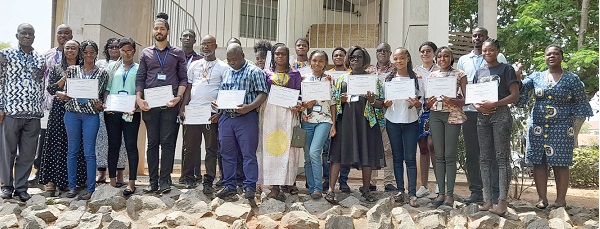African participants at a genomic surveillance training have asked the World Health Organisation (WHO) to make available diagnostic machines needed for genomic sequencing to African countries that do not have them.
The 10 biologists drawn from eight African countries, who took part in the 10-day training programme on sequencing for genomic surveillance, said with the machine, known as Nanopore, all the countries could do proper and fast diagnosis not only of the SARS-Cov-2 virus, but also other diseases that affected the continent.
Since its detection in 2019, the SARS-Cov-2 has evolved over time, accumulating mutations that have resulted in distinct virtual lineages.
Genomic surveillance has, therefore, become a priority to detect, monitor and analyse circulating variants of the virus to determine if some of them may lead to increased transmissibility and disease severity or affect the effectiveness of diagnostic tests, vaccines and treatments.
Training
The biologists from Benin, Cape Verde, Cote d’Ivoire, Guinea, Liberia, Mauritania, Sierra Leone and Togo completed the 10-day training at the Noguchi Memorial Institute of Medical Research of the University of Ghana last Friday.
It was part of a recommendation of the Emergency Committee convened by the WHO Director-General to increase global genomic sequencing capacity and for the WHO to actively assist countries in strengthening routine genomic surveillance.
The implementation of sequencing platforms in each country required a reorganisation of laboratories and specific training for biologists in these new techniques and it is in line with this that the training was organised.
Participants
A participant from Liberia, who spoke on behalf of the participants in an interview, Mr Aaron T. Momolu, pointed out that the challenge most African countries face with regards to COVID-19 was limited diagnostic machines and added that often, when they identified a new disease, the tools were not available to do further tests.
For that reason, by the time they get them, the disease might have progressed.
“In Liberia, for instance, we had the PCR equipment to determine that yes, there is COVID-19 in the country, but as to what strain of the virus we have, we did not have that capacity. We, therefore, have to send our samples to Ghana which is overwhelmed with those it is handling from other countries,” he explained.
Describing what they have learnt as very beneficial, Mr Momolu said, among others, they had the opportunity to learn how to use the Nanopore machine to do sequencing, which for some of them, they had never touched before.
He said they did not want the situation whereby after acquiring the knowledge they had had at the training, they would go back to their countries and the equipment to work with were not there.
He, therefore, appealed to the WHO to make the machines available within the specified time.
One of the facilitators of the programme from the WHO Regional Office in Dakar, Senegal, Dr Berthe-Marie Njanpop, said the training, which was organised in partnership with the Noguchi Memorial Institute for Medical Research and the WHO Regional Office for the Africa Region (WHO AFRO), was the third of its kind to be organised with the first one held in Senegal and the second one hosted by Nigeria.
She said the 10 biologists that underwent the training made it a total of 82 biologists that had so far been trained in sequencing for genomic surveillance either face-to-face or virtual.
She pointed out that continuous practice was the best way to improve and urged the participants to start a network not only for COVID-19 but for other diseases such as HIV, tuberculosis and Ebola.
Dr Njanpop expressed the commitment of the WHO and its partners to continue to invest in trainings such as this.
For his part, the Coordinator for the programme, Dr Bright Adu, mentioned some of the training given to the participants included biosafety and biosecurity; how to package and prepare samples for transportation; how to do genetic sequencing; how to analyse the result from the sequencing machine, how to identify variants of the virus they have sequenced and how to submit genetic data.
He described the training as relevant, especially in this era where genetic diseases are causing a lot of public health problems.
Source: Graphic Online





